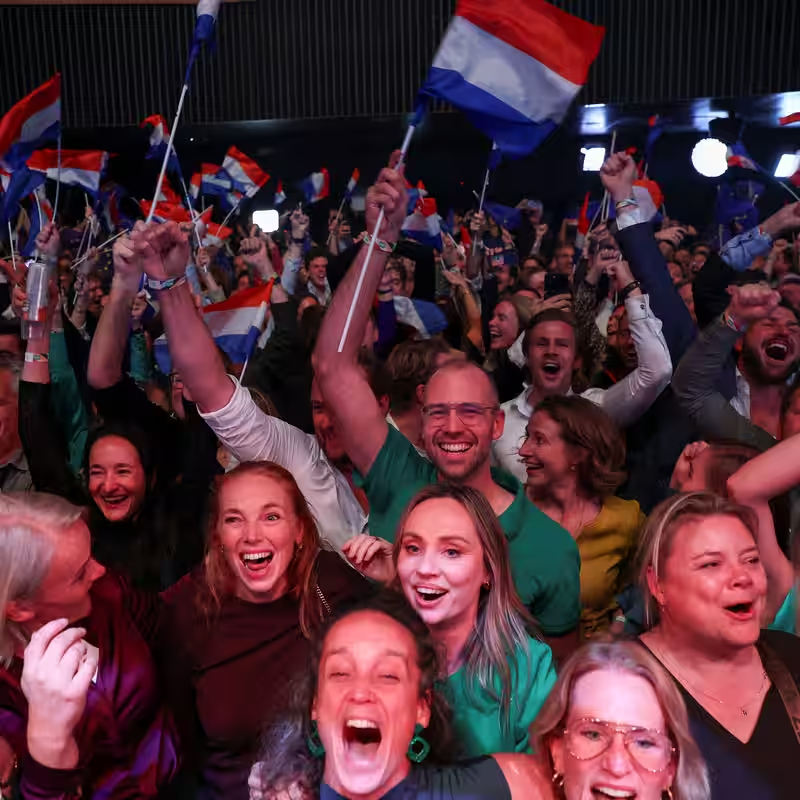Wilders’ Far-Right Party Crumbles in Dutch Election Shock
In a dramatic reversal of fortune, Geert Wilders’ anti-immigration Party for Freedom (PVV) has suffered a major setback in the Netherlands’ 2025 parliamentary elections. Exit polls reveal the far-right party is projected to lose 12 seats in the 150-member House of Representatives—dropping from 37 to just 25 seats.
Center-Left D66 Emerges as Largest Party
Democrats 66 (D66), a center-left liberal party led by Rob Jetten, is now poised to become the largest party in Dutch politics for the first time in its 59-year history. With a projected 27 seats—an 18-seat gain—D66 has capitalized on voter fatigue with political chaos and a desire for stability.
“Millions of Dutch people chose positive forces and politics that looks ahead,” Jetten declared to a jubilant crowd waving Dutch flags in The Hague.
Why Wilders Lost Ground
Wilders, who stunned the political establishment by winning the most seats in the 2023 election, failed to translate that momentum into governance. His refusal to compromise on becoming prime minister blocked coalition talks, and his abrupt withdrawal from the governing coalition in July triggered these early elections.
This time, however, other major parties explicitly ruled out working with the PVV. “A vote for Wilders was effectively a wasted vote,” said Janka Stoker, professor at the University of Groningen.
Far-Right Fragmentation, Not Decline
While the PVV lost ground, the broader far-right bloc remains potent. Two other nationalist parties—JA21 and Forum for Democracy—are projected to gain a combined 11 seats, nearly offsetting Wilders’ losses. This suggests Dutch voters haven’t abandoned right-wing populism; they’ve simply redistributed their support.
Key Issues That Shaped the Vote
- Housing crisis – soaring costs and shortages
- Immigration policy – Wilders’ calls to ban the Quran and tax headscarves polarized debate
- Healthcare access – a growing concern among aging voters
- Political stability – after years of short-lived coalitions
What’s Next? Coalition Talks Begin
No party holds a majority, so coalition negotiations are expected to take months. D66’s centrist positioning gives it unique leverage—it can bridge left and right. “D66 moved slightly right this campaign, making it a viable partner across the aisle,” noted Simon Otjes, Dutch politics expert at Leiden University.
Election Results Snapshot (Projected)
| Party | 2023 Seats | 2025 Seats (Projected) | Change |
|---|---|---|---|
| Democrats 66 (D66) | 9 | 27 | +18 |
| PVV (Wilders) | 37 | 25 | –12 |
| Green–Labor Bloc | 25 | 20 | –5 |
| JA21 + FvD | 5 | 16 | +11 |
Frans Timmermans, leader of the Green–Labor alliance, resigned Wednesday night after his bloc’s disappointing showing. “Better times will come,” he told supporters.
Voters Speak: “We Want a Decent Country Again”
From Amsterdam to The Hague, voters expressed exhaustion with division. “I never used to be into politics,” said Gigi van Steenbergen, 48, “but now it takes up 75% of my thinking time.”
Another voter, Aaltje de Roos, echoed the sentiment: “It’s important that we become a decent, reasonable country again.”
Broader European Context
The Dutch result stands in contrast to rising far-right influence in countries like France, Germany, and Italy. Experts caution, however, that populism isn’t defeated—it’s evolving. “Centrist parties are now adopting stricter immigration rhetoric,” Otjes explained, “blurring the lines.”
Sources
The New York Times – Dutch Voters Deliver Major Setback to Far-Right Party of Geert Wilders




